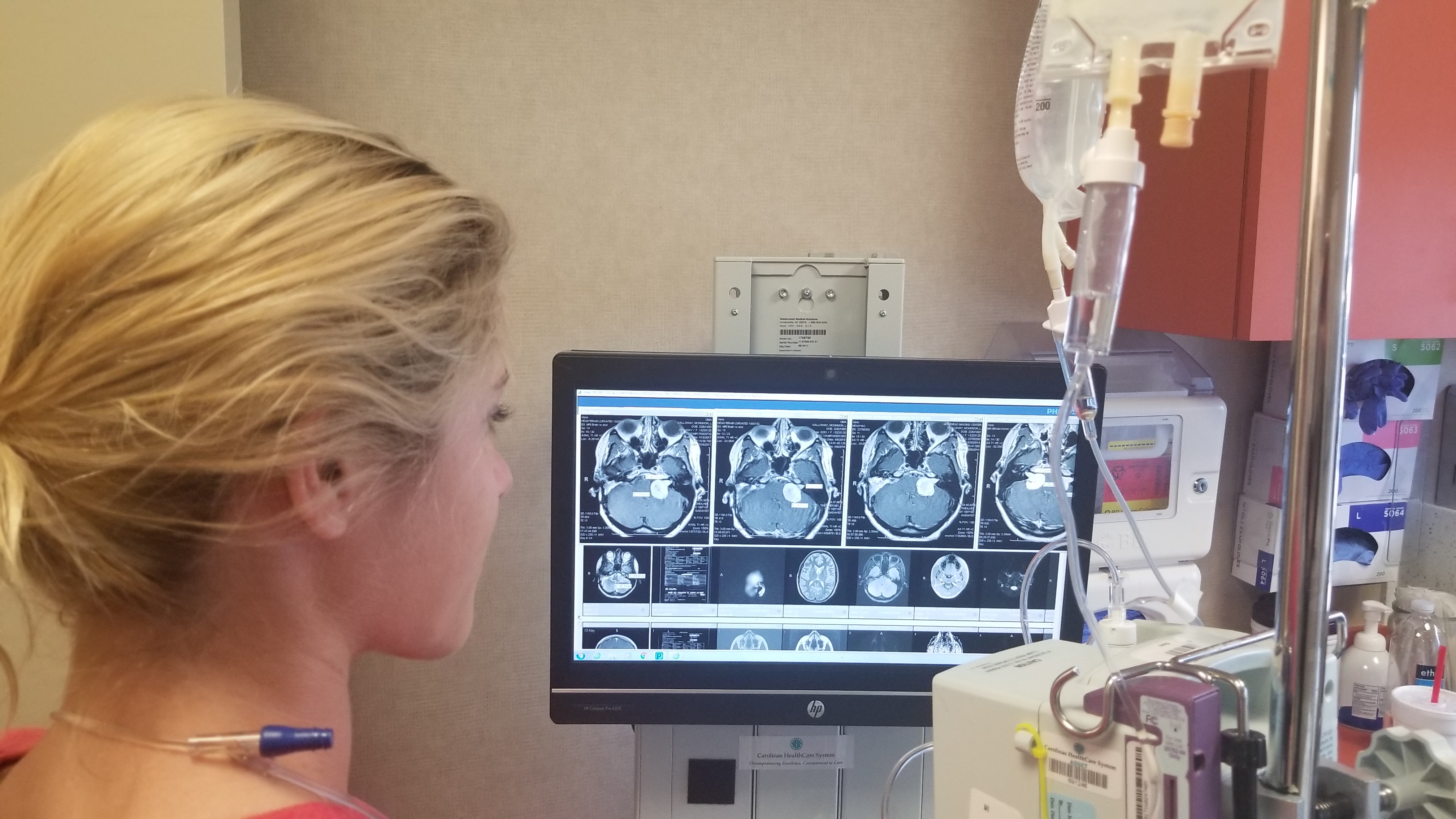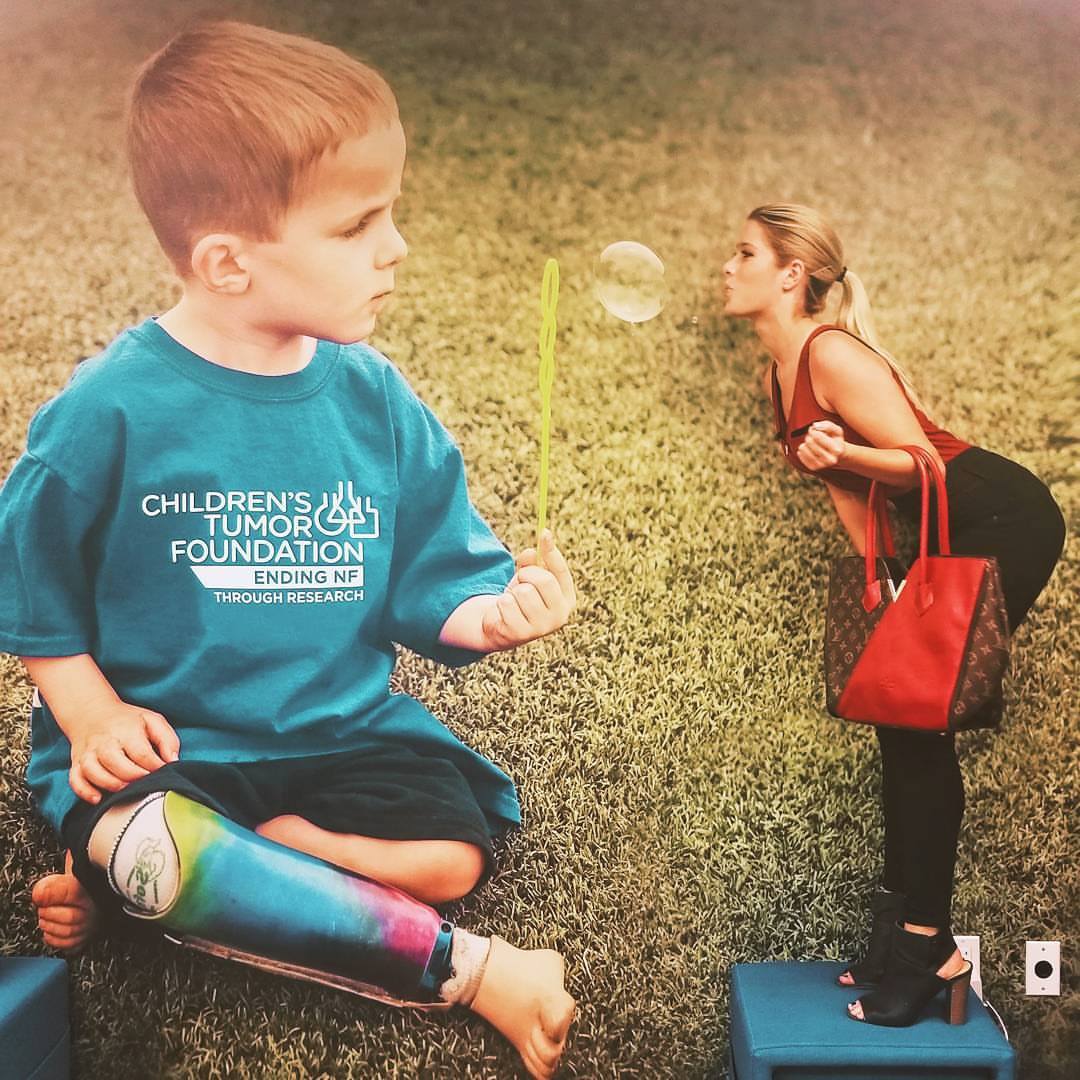McKinnon Galloway will be honored at the 2018 Ruby Anniversary Gala in NYC on October 22, 2018 as our incoming 2019 Children’s Tumor Foundation NF Ambassador. To attend or support the Gala, please visit ctf.org/nygala. And read below to learn more about the remarkable NF story of McKinnon Galloway.
McKinnon Galloway is a young adult who lives in Charlotte, North Carolina. She was diagnosed with NF2 at age 16 after a volleyball hit her in the head during a high school match, causing a concussion. A scan revealed she had tumors unrelated to the concussion. McKinnon has lived the last 10 years of her NF journey showing only her brave face, while hiding the brutal reality of her condition from most. She hopes that her decision to change how she lives with NF and to tell about her experience will be a source of encouragement and comfort to others, in knowing that they are not alone. She also wishes to use this next year as the NF Ambassador to share her story in order to raise funds and awareness and to educate the greater community and help find a cure.
The concussion that McKinnon sustained during the volleyball match is what prompted a routine MRI, which ended up changing the course of her life dramatically. The doctors explained that she had two tumors in her brain and predicted that she would go deaf by the time she graduated high school. She and her family were in complete shock. One day, she was a normal healthy teenage girl with the bright future and the next, an NF2 patient on an unforeseen path of uncertainty and fear.
McKinnon’s parents scrambled to learn what they could about a diagnosis they had never before known. What they learned terrified them. They absorbed the very real possibilities of deafness, blindness, muteness, balance issues, paralyzation, seizures, and much more. They discovered that there is no cure, which devastated them at first, but eventually became their motivation to get involved. They established care for McKinnon in the Children’s Tumor Foundation’s NF Clinic Network at John’s Hopkins Hospital in Bethesda, Maryland. Dr. Jaishri Blakely is the doctor who guides them with McKinnon’s care and who stood beside them then as they learned about the severity of her condition. When they discovered that the tumors were growing aggressively, Dr. Blakely recommended chemotherapy and ultimately, surgery. McKinnon’s first brain surgery was scheduled on her 18th birthday. The 8-hour surgery was initially successful in preserving her hearing.
Over the last 10 years as she endured multiple medical challenges, McKinnon struggled privately with feelings of self-consciousness, depression, shame, and paralyzing fear. She buried her feelings and withheld the seriousness of her deteriorating condition from her family, her friends and everyone she met. She hid behind a dazzling, but artificial, smile and forged ahead as the epitome of strength and courage when all she really wanted was to be “normal” or to disappear completely.
“When I was diagnosed, my boyfriend at that time broke up with me. Some of my friends walked away and out of my life. I had overheard a parent talking about me, and she labeled me as the “sick girl.” All I wanted to do was curl up in a ball in my room and never come out again. I was ashamed of myself for what my body couldn’t do. I felt judged for something I couldn’t control. When I needed support, I wouldn’t ask for it. I was scared to talk to anyone else that had this because I was scared of the possibilities of what could happen to me. I ended up burying my feelings deep inside. I knew it wasn’t healthy but I had refused to show anyone else I was weak. This was my problem so therefore, I shouldn’t burden anyone else with it, was my mentality.”
Eventually, McKinnon did lose hearing on one side, despite being enrolled in a phase I clinical trial for a chemotherapy drug and undergoing a second brain surgery. The surgery was successful in saving her smile from full facial paralysis, which was somewhat ironic because her desire to smile diminished as the depression continued to deepen and her resolve to not burden her loved ones grew stronger.

“I was so self- conscious about burdening my friends and family with worry, that I always pushed myself too hard. This wasn’t because I wasn’t supported; it was because I didn’t love myself. I was angry at my body for making everyone I loved around me worry and cry. While fighting this illness is beyond difficult, it’s heart- crushing to see the sorrow in the eyes of everyone you care about when they look at you.”
She struggled to adjust to the hearing loss and attempted to conceal it as best she could. McKinnon’s description of her experience is best told in her own words:
“I know that it may seem like losing one ear of hearing isn’t a big deal but it is still a change and adjustment. My localization of hearing was gone and I could no longer hear in what direction things were coming from. Because I don’t have much balance, it’s dangerous when I am around any motorized vehicle. I was so embarrassed that I didn’t really tell anyone that I couldn’t hear much and just pretended to listen in loud places because I didn’t want to trouble them. I felt as though I had inconvenienced enough people with this illness and I refused to burden anyone else. People thought I was being rude when they tried to talk to me on my deaf side but I just simply didn’t hear them. When we watched movies, I couldn’t hear what exactly the people were saying but I didn’t want to use subtitles because I felt it would bother everyone else, so I just sat there watching the pictures and piecing a story together in my head.”
Simultaneously, while she learned a new normal with her hearing loss, she began a two-year long battle when a simple scratch on her face became infected due to her chemotherapy-suppressed immune system. It progressed in severity and she did her best to hide the damage to both her face and to her emotional well-being.
“I had put my body through so much and had fought so hard to save my face only to have a staph infection threaten it. All of the feelings that I had bottled up for 6 years came flooding out. I had hit rock bottom with my depression and simply didn’t want to be alive anymore.”
Exhausted, and emotionally drained, McKinnon moved home from college and took a semester off to recuperate. She refused to leave her house and spent most of her days alone and crying. It became apparent even to her that she needed help and at long last, she began therapy. As plastic surgeons attended to the facial scarring left by the infection, a therapist helped her with her emotional scars. She knew it was time to let go of her feelings of inadequacy and being a burden to others and she worked hard in therapy to do that.
But as fate would have it, just as her psychological healing began, a new medical challenge arose. While visiting a friend, McKinnon suffered a Tonic-clonic (Grand Mal) seizure, which lasted a full ten minutes (most only last a couple of minutes). Her friend, a cardio-thoracic nurse, is likely the one who saved her life by springing to action quickly to get her the medical attention she needed. McKinnon was then transported to John’s Hopkins Medical Center and diagnosed with Epilepsy. She was prescribed a drug that caused an adverse mood reaction of rage as well as memory loss. She struggled to maintain her gains in therapy and her grades in school for a year and half before being switched to another drug. The process of switching drugs was intensive and required hospitalization.
“I was confined to a hospital bed for 5 days straight to make sure I didn’t have a seizure while they slowly weaned me. My head was hooked to what seemed to be a million cables and they were plugged into the wall for monitoring. I couldn’t go more than four feet in any direction. After that, my personality completely changed. I was no longer angry at the world and I could actually do my schoolwork and get the grades I deserved for my efforts.”
Today, McKinnon is completing the Bachelor’s Degree that she began six years ago. She will earn a BA in Liberal Studies in December 2018 with a concentration in business, communications and psychology. She is interested in becoming an Art Director in a marketing company or to work in product design. When she’s not studying, in treatment, or juggling doctor visits and MRIs (she’s had about 35 to date), she enjoys photography as a hobby. When asked what she prefers to photograph, McKinnon replied, “I love photographing people. Particularly when there is a big life event, I love being there in that moment and capturing it in photos. I can create something, with editing, that really makes the person feel good about themselves.”
Ten years after starting on Avastin, McKinnon is grateful for the research that has helped her to maintain the hearing in her left ear, but she is hopeful for continued research because the drug is beginning to damage other body systems as a result of the long-term use. She wants to work with researchers and to educate donors on behalf of all NF2 patients.
“This journey has taught me so many things. It’s taught me that those who walked out of my life, judging my illness, don’t matter, because they will be replaced with people who love and support me. It’s taught me how precious life is and that every moment should be cherished. I am grateful for the years that I have had but I am also hopeful for the future of finding a cure. Most importantly I have finally learned to love myself. I made a resolution this year to not be afraid, but I want others who share this illness to know that it’s not a weakness to be afraid. It’s okay to have these feelings that I have talked about throughout my story. I know what it’s like to have support all around you yet you feel so alone. One thing I’ve learned is that this illness does not define you; it only strengthens you. This disorder isn’t pretty. It might even drive a wedge between you with family and friends. It can make you question who you are. In these times, just remember you are like a diamond; when put under heat and pressure, we only then can be shaped to be our best selves. You are perfect the way you are so embrace it.”
“I am so honored and proud to be the National Ambassador for CTF this year. I am excited to raise funds and awareness but also to help others who share feelings that I have had over the years. I am no longer sugarcoating this illness. It needs to be taken seriously. We all need to stand together to fight for the cure. This is the year that things are going to change. I just know it.”


